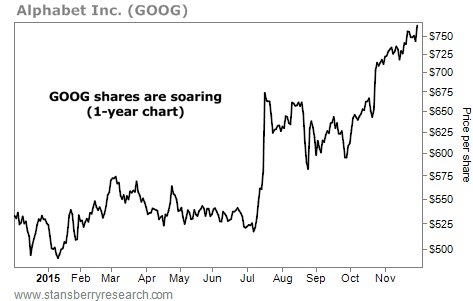| Home | About Us | Resources | Archive | Free Reports | Market Window |
|
Editor's note: Today, we're featuring our friend and master speculator Doug Casey. Doug is one of the most entertaining and controversial newsletter writers in the world. In today's essay, he shares some of the ways to protect yourself and prosper in an economic crisis...
Money – How to Get It and Keep ItBy
Wednesday, December 2, 2015
Even if you are already wealthy, some thought on this topic is worthwhile. What would you do if some act of God or of government, a catastrophic lawsuit, or a really serious misjudgment took you back to square one?
One thing about a real depression is that everybody loses. As Richard Russell has quipped, the winners are those who lose the least. As far as I'm concerned, the Greater Depression is looming, not just another cyclical downturn. You may find that although you're far ahead of your neighbors (you own precious metals, you've diversified internationally, and you don't believe much of what you hear from official sources), you're still not as prepared as you'd like.
I think a good plan would be to approach the problem in four steps: Liquidate, Consolidate, Create, and Speculate.
Step 1: Liquidate
Chances are high that you have too much "stuff." Your garage, basement, and attic are so full of possessions that you may be renting a storage unit for the overflow. That stuff is costing you money in storage fees, in depreciation, and in the weight of psychological baggage. It's limiting your options... It's weighing you down. Get rid of it.
Right now, it has a market value. Perhaps to a friend you can call. Or to a neighbor who might buy it if you have a yard sale. Or to some of the millions of people on eBay. A year from now, when we're out of the eye of the financial hurricane and back into the storm, it will likely have much less value. But right now, there's a market. Even if most people are no longer wearing those "He who dies with the most toys, wins" T-shirts that were popular at the height of the boom, there are still buyers. But the general standard of living is dropping, and mass psychology is changing. In a year or two, you may find there aren't any bids and the psychology of the country has changed radically. People will be desperate for cash, and they'll all be cleaning out their storage units (partly because they can't afford the rent on them).
Liquidate whatever you don't actually need – clothes, furniture, tools, cars, bikes, collections, electronics, properties, you name it. You'll be able to rebuy something like it, or better and cheaper. Just as important, you'll feel light and mobile, unburdened by a bunch of possessions that own you and weigh you down. It will definitely improve your psychology, which is critical to the next stage. And the cash it generates will be helpful for the rest of the plan.
Step 2: Consolidate
Take stock of your assets. After Step 1, that should be a lot easier because you'll have less junk but a lot more cash. You'll already feel more in control and empowered. And definitely richer. But your main assets aren't money or things. It's the knowledge, skills, and connections you possess. Take stock of them. What do you know? What can you do? Whom do you know? Make lists and think about these things, with an eye to maximizing their value.
If you're light on knowledge, skills, and connections, then do something about it – although if you're reading this, you probably already live life in a way that builds all of those assets daily. But there's always room for improvement. Think the Count of Monte Cristo. Or if you're not so classically oriented, think Sarah Connor after she met the Terminator.
Part of this process is to look at what you're doing now. The chances are excellent there's a better and more profitable allocation of your time. Even successful rock stars tend to reinvent themselves every few years. You don't want to get stale. That leads to Step 3.
Step 3: Create
Remember, the essence of becoming wealthy is to produce more than you consume and save the difference. But it's hard to maximize value working for somebody else. And when you're given a job, it can be taken away for any number of reasons. There is cause, and there is effect. You don't want to be the effect of somebody else's cause. You want to be the cause for everything in your life. That implies working for yourself. At least turn your present employer into a partner or an associate.
Perhaps go through the Yellow Pages (while they still exist), page by page, line by line, and see what you can provide as a service for the businesses advertising there. I promise you, they're all looking for someone to come along, kiss their world, and make it better. Think like an entrepreneur at all times. Remember that there is an infinite desire for goods and services on the part of the 7 billion other people on the planet. Find out how you can give them what they want, and the money will roll in.
I've said many times that I believe you could airdrop me naked and penniless into the heart of the Congo, and by the time I emerged, I'd not just have survived, I'd come out wealthy. And believe me, I don't think wealth is by any means the most important thing in life; it's important, but should be considered a convenience, not an imperative. Not that I'd want to be airdropped into the Congo at the moment. I've gotten a bit lazy, I have other interests, and you can't be everywhere and do everything.
But now that I think about it, if I wanted to make a real fortune today from a small base, I might prefer Africa to any other continent. As an educated Westerner, you can quickly meet anyone on an equal level much more easily than you could at home. If you have a reason that makes any sense at all, you can be in the office of the president within a week. These countries are all plagued with incompetence and corruption, they need everything, and they're full of untapped resources and talent. This all inures to the great advantage of a foreign entrepreneur.
Here's an idea. For your next vacation, book a trip to Cameroon, Togo, Gabon, Zimbabwe, or Angola. Go through the Yellow Pages in the capital and meet everybody who is anybody. The chances are good you'll come up with several deals in the first week alone. If you can't find the time, send your kid who's just out of school and idiotically thinks he may want to misallocate time and money getting an MBA. This idea alone should be worth a million dollars. Or as I would prefer to think of it, 700 ounces of gold.
But to an economist, money, like all goods, has "declining marginal utility." In other words, the more of something you have, the less you need or want the next unit. Of course, more is always better, but it's unseemly, even degrading, to pursue anything beyond a certain point.
When I was in Toronto a few months ago, I spoke with a Chinese friend who, I believe, is worth at least $250 million. As he waxed philosophic, he allowed that he didn't feel he really needed more than 30 extra-large to live exactly as he liked. I agreed, in that meals in the best restaurants, as well as the finest clothes, cars, and houses only cost so much. And it's well within a conservative return on that capital, without ever even touching the principal. Is it worth it to get more? Perhaps not, unless your interests in the rest of life are entirely too narrow. The point of money is to allow you freedom, not make you crazy with getting more.
That doesn't rule out speculation as an avocation, however. More – everything else being equal – is still better.
Step 4: Speculate
You've got money. Now, you have to keep it and make it grow, because staying in the same place amounts to going backwards. That's partially because the world at large will continue getting wealthier, even as the dollars you own lose value.
In the past, I've discussed why a lot of old rules for success are actually going to prove counterproductive over the next few years. Saving with dollars will be foolish as they dry up and blow away. Investing according to classic rules will be very tricky in a radically changing economy. Most people will try to outrun inflation by trading or gambling. The markets, which are the natural friend of productive people, will perversely prove very destructive to them in the years to come. You'll know when the final bottom in the stock market has come: The average guy won't want to hear about the stock market, if he even remembers it exists. And if he does, he'll want it abolished.
Instead of becoming a victim of inflation and other politically caused distortions in the marketplace, you can profit from these things. Rational speculation is the optimum approach.
The Bottom Line
If you want serious money, you have to get serious about money. You need to understand these fundamentals and never forget them. Don't let all the garbage reported in the financial media you read, see, or hear confuse you about what money really is. Don't consume more than you make: save! Don't spend: invest!
Regards,
Doug Casey
Further Reading:
Dr. David "Doc" Eifrig has shown readers how powerful it can be to hold "chaos hedges" – like gold – in your portfolio... "When investors get nervous about bad economic news... debt crises in Europe... and the specter of runaway inflation in the United States," he writes, "stocks fall, and gold and silver rise." Learn how Doc protects his wealth with precious metals here and here.
Earlier this year, Brian Hunt and Ben Morris showed Growth Stock Wire readers how to build a portfolio that will handle any crisis. "Cash is an extremely important part of your catastrophe-prevention plan," they write. "It's 'dry powder'... It allows you to buy bargains if they appear." Learn more here.
Market NotesTHIS INNOVATIVE TECH GIANT JUST HIT AN ALL-TIME HIGH Today's chart showcases another elite tech company ripping higher...
Over the years, we've written about many of the world's biggest, best tech stocks... companies like consumer-electronics behemoth Apple, software leader Microsoft, and networking giant Cisco, just to name a few. These companies have thick profit margins and generate huge amounts of cash.
Today, we're featuring another successful tech stock... Alphabet Inc. (formerly known as Google). At its core, the company is an advertisement seller and search engine. But it has expanded into other businesses recently, including building robots and self-driving cars. The recent spinoff will reorganize the business and help it grow.
As you can see from the chart below, business has been good for the tech giant. Shares are up 40%-plus over the past year... and just rallied to a new all-time high. It's an innovative, fast-growing, cash-rich business to add to our list of tech winners.
 |
Recent Articles
|



